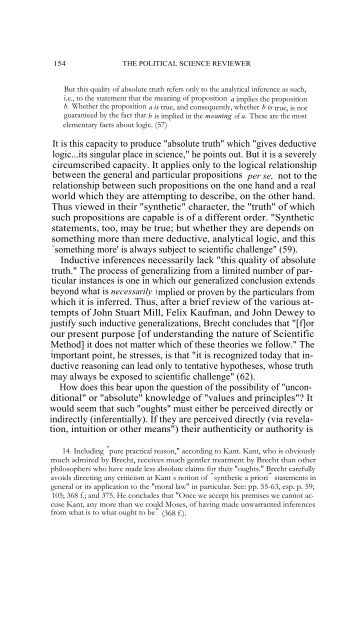ARNOLD BRECHT'S POLITICAL THEORY REVISITED Political ...
ARNOLD BRECHT'S POLITICAL THEORY REVISITED Political ...
ARNOLD BRECHT'S POLITICAL THEORY REVISITED Political ...
You also want an ePaper? Increase the reach of your titles
YUMPU automatically turns print PDFs into web optimized ePapers that Google loves.
154 THE <strong>POLITICAL</strong> SCIENCE REVIEWER<br />
But this quality of absolute truth refers only to the analytical inference as such,<br />
i.e., to the statement that the meaning of proposition a implies the proposition<br />
b. Whether the proposition a is true, and consequently, whether b is true, is not<br />
guaranteed by the fact that b is implied in the meaning of a. These are the most<br />
elementary facts about logic. (57)<br />
It is this capacity to produce "absolute truth" which "gives deductive<br />
logic...its singular place in science," he points out. But it is a severely<br />
circumscribed capacity. It applies only to the logical relationship<br />
between the general and particular propositions per se, not to the<br />
relationship between such propositions on the one hand and a real<br />
world which they are attempting to describe, on the other hand.<br />
Thus viewed in their "synthetic" character, the "truth" of which<br />
such propositions are capable is of a different order. "Synthetic<br />
statements, too, may be true; but whether they are depends on<br />
something more than mere deductive, analytical logic, and this<br />
`something more' is always subject to scientific challenge" (59).<br />
Inductive inferences necessarily lack "this quality of absolute<br />
truth." The process of generalizing from a limited number of particular<br />
instances is one in which our generalized conclusion extends<br />
beyond what is necessarily implied or proven by the particulars from<br />
which it is inferred. Thus, after a brief review of the various attempts<br />
of John Stuart Mill, Felix Kaufman, and John Dewey to<br />
justify such inductive generalizations, Brecht concludes that "[f]or<br />
our present purpose [of understanding the nature of Scientific<br />
Method] it does not matter which of these theories we follow." The<br />
important point, he stresses, is that "it is recognized today that inductive<br />
reasoning can lead only to tentative hypotheses, whose truth<br />
may always be exposed to scientific challenge" (62).<br />
How does this bear upon the question of the possibility of "unconditional"<br />
or "absolute" knowledge of "values and principles"? It<br />
would seem that such "oughts" must either be perceived directly or<br />
indirectly (inferentially). If they are perceived directly (via revelation,<br />
intuition or other means") their authenticity or authority is<br />
14. Including " pure practical reason," according to Kant. Kant, who is obviously<br />
much admired by Brecht, receives much gentler treatment by Brecht than other<br />
philosophers who have made less absolute claims for their "oughts." Brecht carefully<br />
avoids directing any criticism at Kant ' s notion of " synthetic a priori " statements in<br />
general or its application to the "moral law" in particular. See: pp. 55-63, esp. p. 59;<br />
105; 368 f.; and 375. He concludes that "Once we accept his premises we cannot accuse<br />
Kant, any more than we could Moses, of having made unwarranted inferences<br />
from what is to what ought to be " (368 f.).
















